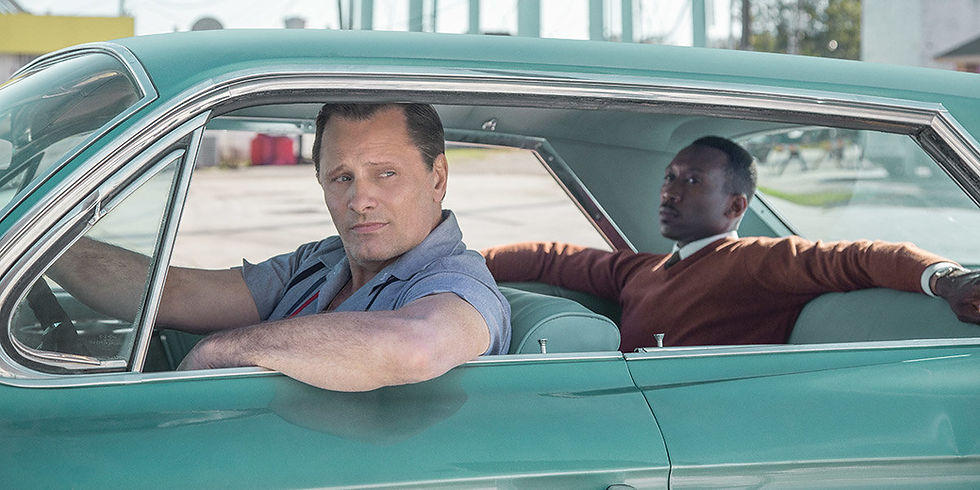Green Book
- patrickkok
- Mar 6, 2019
- 3 min read
Updated: Feb 6, 2023
Released 2018. Director: Peter Farrelly

IT'S EASY TO SEE WHY GREEN BOOK is popular with cinema audience. The movie is a crowd pleaser from start to finish, a story of a black man and a white man from very different backgrounds. Their friendship is mostly light and breezy, with some funny lines now and then and a feel-good ending that puts a smile on your face.
It’s also easy to see why Green Book is ultimately disappointing. The movie is a cop-out, a story of an inter-racial employer/employee relationship that skips an inherently complex situation and simplifies their friendship for bland entertainment.
The time is 1962 when parts of America still practiced outright racial discrimination with black people prohibited from certain establishments like hotels and restaurants. Classical jazz pianist Don Shirley hires ex-bouncer Tony ‘The Lip’ Vallelonga to be his driver on his 8-week performance tour of the Deep South.
Here are two very different people spending a lot of time together. We’ve seen in an earlier scene what Tony feels about black people. After two African American workmen finished their job at Tony’s kitchen, he throws away the two glasses they’ve just drunk from, as if they've been contaminated.
He goes to see Don Shirley not knowing he’s black; and after initially rejecting the job, he changes his mind. After all, he needs it and the money is really good. Don, on the other hand (and the other side of New York City), lives above Carnegie Hall surrounded by paintings and sculptures, sits on a throne, doesn’t eat without cutlery, is a polished and articulate man who needs Tony as a bodyguard to negotiate tricky situations with white folks.
The performances of this odd couple pairing are the best aspects of Green Book. Viggo Mortensen plays a buffoonish, tough talking, street smart opportunist who is not averse to a little underhanded way if it gets him what he wants. It’s a side of Mortensen never seen on screen before, almost an antithesis to the tense, unsmiling, silent killer roles he’s more associated with in movies like A History of Violence, The Return of the King and Eastern Promises. As if he’s peeled off a layer of façade and a different man has emerged.
Don Shirley is also a career highlight for Mahershala Ali, who imparts a sense of sophistication, dignity and righteousness that belies his insecurity, indignation and loneliness. Both actors give commendable performances and their chemistry is natural. Shame that the script treats both characters rather shabbily, instead of working harder to get inside these characters, in particular Don Shirley. He basks in a cocoon of professional recognition among a small elite but Don is a man displaced, belonging nowhere, not with the white folks, not with his own. A character with so much narrative potential deserves more from his writers. A key scene at a YMCA that reveals Don’s secret about his sexuality is treated as a twist and was never picked up again, even in passing, as if it’s nothing of consequence to the person he was.
The most important scene in helping us understand the character of Don Shirley came and went in a blink. As their car stops next to a field, Don looks out and see black farmers toiling under the sun, men and women in raggedy clothes, a world apart from him, pause and stare at this well dressed black man chauffeured by a white man. It’s a missed moment when director Peter Farrelly could have found a way to express Don’s alienation and open a window into the man’s clearly conflicted soul. Instead, nothing happens.
Tony takes the job for the money. He drives, makes sure Don gets to the venues because only then he gets paid. Don helps Tony write some letters to his wife. Tony shows Don how to eat fried chicken with his fingers and throws the bones out the window. I know it’s meant to inject some humour. Through it all Tony’s change of heart is less than convincing.
The end is particularly jarring. Don and Tony arrive back in New York City on a snowy Christmas Eve. Tony returns to a warm, noisy home full of laughter and food. Don goes back to his loft all alone. So he takes up Tony’s earlier invitation and appears at his new friend’s doorstep. Very unsubtle writing and directing.
Tony’s son, Nick Vallelonga, is one of three writers responsible for the script. Don’s family, as I learn later, was never consulted in the making of the movie. A one-sided story tackling inherently sensitive and delicate, generations-old race relations in the form of a buddy comedy, Green Book is all big text, no subtext.




Comments